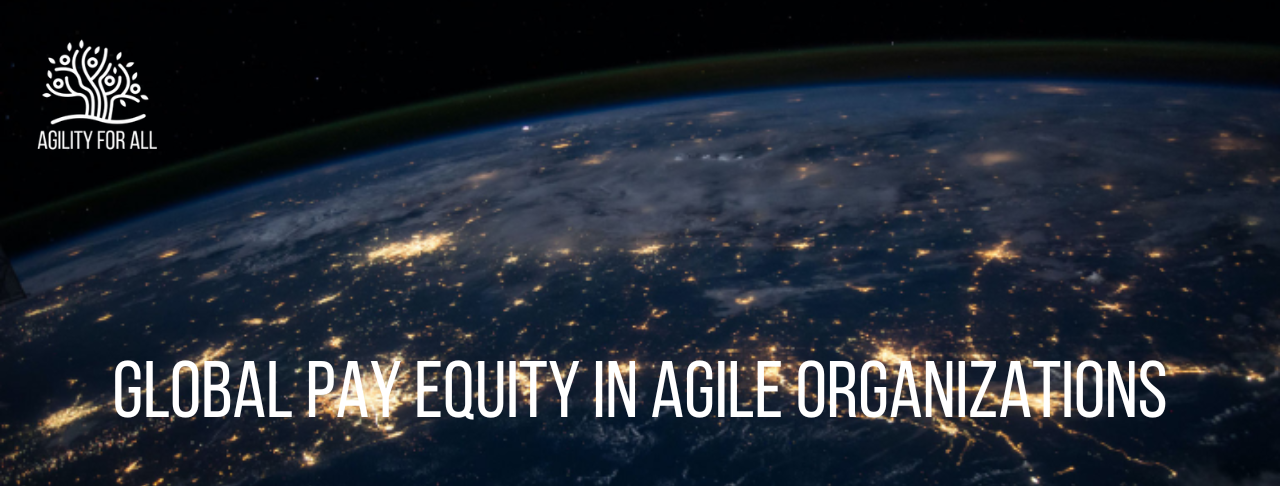
Global Pay Equity in Agile Organizations
21/04/2021
Global pay equity? How is this a topic that is relevant to Agility for All and its mission? Well, as always I have a story to share with you. As 2020 unfolded we saw more and more big companies announcing they were going remote forever or remote first. They vowed to make remote work a priority. Then we watched the looks of panic as they didn’t know how to do that and follow their old business model at the same time. Well of course not. If you don’t have a flexible business model then how do you have flexibility in your work practices and culture? The lack of agility was becoming evident as the year wore on. I even spoke to one multinational company who regaled me with their remote work positions and then told me all about the perks they offered in the headquarters office which is currently closed. When I asked what that meant for the remote workers there was an awkward silence and then a bit of stumbling through an explanation about how it will be an enticement for people to want to come back to have the gym, the coffee club, breakfast munchies, etc. The chasm between reality and perception was growing.
Pay Inequality Exists Beyond Gender
But what does that have to do with pay equity you say? When we think about pay equity, you will overwhelmingly find research done on equity between men and women. I was very surprised though to see in a world of data driven everything that a report touting the equity or inequity of men and women in 2018-2019 was actually data from as far back as 2012. What you don’t see a lot of is research about pay disparities between countries or regions. So, I know many of you will be disappointed, but I will not provide you with statistics and reports in support of global pay equity or the inequalities that exist now.
Pay Equity and Agility?
But I will now share that story with you about why this is important and what it has to do with agility. I got into a rather heated discussion with someone about this very topic a few weeks ago. It was someone who prided herself on being a global thinker, but yet what I was suggesting was so far out of the realm of her thinking that she was spewing vitriol by the end of the conversation. I said that one of the challenges that companies were facing with the concept of remote first was how to address salaries. And the reason for this was a classist thinking. The shock and awe began with that statement. Her rationale was that someone in Bangladesh did not deserve the same wage as someone in (insert any country in Europe) and definitely not as much as someone in the United States where everyone knows salaries are higher. Why? Not because the people in Bangladesh were less skilled, but because workers in the other regions of the world were more deserving of higher salaries than someone in Bangladesh because they could live on practically nothing. And that because the economy of Bangladesh was struggling and wages were abominably low, that somehow it was OK to pay a highly skilled worker pennies on the dollar because of that. I brought up the fact that if we needed a skilled worker pre-pandemic we would have offered them a work visa to come to the US to work where they would have received a salary in line with other workers in the same position in the same area (and yes, I know that statement was a bit naïve as they would have tried to pay them as little as possible).
Same Skills, Different Location - Now what?
But somehow this same skilled worker, who in my example was a senior software developer with 15 years of experience in not only a substantial amount of technology but also in emerging technologies the company would need in the next five years to stay competitive, was not deserving of the same pay as his colleagues in the United States solely because he was in Bangladesh. The argument was that their economy and culture didn’t warrant it. That companies must use workers in lower income countries to balance the budget and get more for their money to offset the higher paid workers (remember the two workers have the same skillset). That somehow cheap labor was the only way to survive as a big company working on a global scale. And of course this whole argument was very triggering for me. It threw me back to 2000 when I was told by the giant consulting firm I worked for that my resume did not support me making more money even though I was doing more work and higher skilled work than my male counterparts who were making on average 30% more than I was.
There is a lot of work to be done
The conversation reminded me over and over that no matter how educated or how globally aware someone claims to be that just like race and gender, we have a lot of learning to do within ourselves to create equity in the workplace. I was not deterred, however, and continued to push my topic of global pay scales. In most governments, there is a set pay scale for workers on a specific skill set and level. There is then often locality pay attached to the positions based on where the worker’s duty station or office is located. So in the case of the United States, a worker in Washington DC or New York City would expect a bump over the base salary that is higher than someone living in Oklahoma City. So why couldn’t this work for global private enterprises as well? Why couldn’t there be a base salary for specific positions with a bump for locality pay?
But this isn’t possible!
“What? This wouldn’t work,” was the retort that I heard. “Why not?” “Well you would have to have a negative as well as a positive.” Still stuck on the worker in Bangladesh she said, “well that person would need a decrease from the base because he doesn’t need as much.” I left the conversation without getting my point home to this person but I left even more convinced that it was worth exploring. If we are going to build true agile enterprises then pay equity regardless of race, gender, and location has to happen. And yes, this does mean that people who traditionally would have had “cheap labor” wages would actually be paid for the work they were doing at the skill level needed by the company to move their mission forward.
But it is if you focus on value
It would be assumed that as an agile organization that this person like everyone else was bringing value. AND it also meant that organizations would be part of a more sustainable ecosystem of talent. Companies would have access to talent that they never had before. People who would in the past not even been allowed to apply for a position, would be a relevant part of a team culture steeped in high-performing inclusive and diverse teams.
And if we continue to have the conversation
I am happy to say that I had this same conversation again a week later with someone working in one of the well-known tech giants. He was telling me about how they are still committed to the remote first work culture but are finding it really hard to reconcile several factors. One of those was salary. For those of you who know me, I don’t back down easily so I dove in head first again with the conversation. I have to say, the second time around the conversation was better received. In fact, the person took some notes and asked me questions of things he might propose to his leadership team in their next meeting at the end of the month.
Imagine the value and innovation that would be possible.
Imagine what value and innovation could happen with a broader reach and a more diverse workforce. Imagine if the next time I proposed a global pay scale regardless of geolocation that it didn’t feel like imperialism was still alive and well. The big question is who is willing to embrace this very agile mindset and create a culture where this is the norm?
Does this topic intrigue you? Are you looking for agile solutions for your organization rather than one-size-fits-all solutions? Contact us today to set up a FREE consultation.
Book a Consultation
About the Author:
 INDRA A. BOOKS
INDRA A. BOOKS
With 25 years of award-winning coaching and leadership experience, Indra has a passion for helping companies, teams, and individuals bring about meaningful, goal-oriented transformations which are firmly grounded in Agile principles. She currently works from Spain with companies around the world to achieve sustainable growth based on true agility; helping them make value-based changes and see results with high-performing teams.
Connect with us
 |
 |
 |
Search

WELCOME TO THE AFA LEARNING PORTAL
We offer loads of free information here in the blog and also in our
resource library
AFA provides coaching, consulting, and training programs. In addition to specialized consulting, you have the option to choose from:
- group coaching programs
- masterclasses
- 1-week intensive offsites
Our programs are designed to help your organization to:
- Maximize Employee Engagement
- Foster Self-Organization
- Encourage Innovation
- Attain Higher Performance
- Be More Agile
